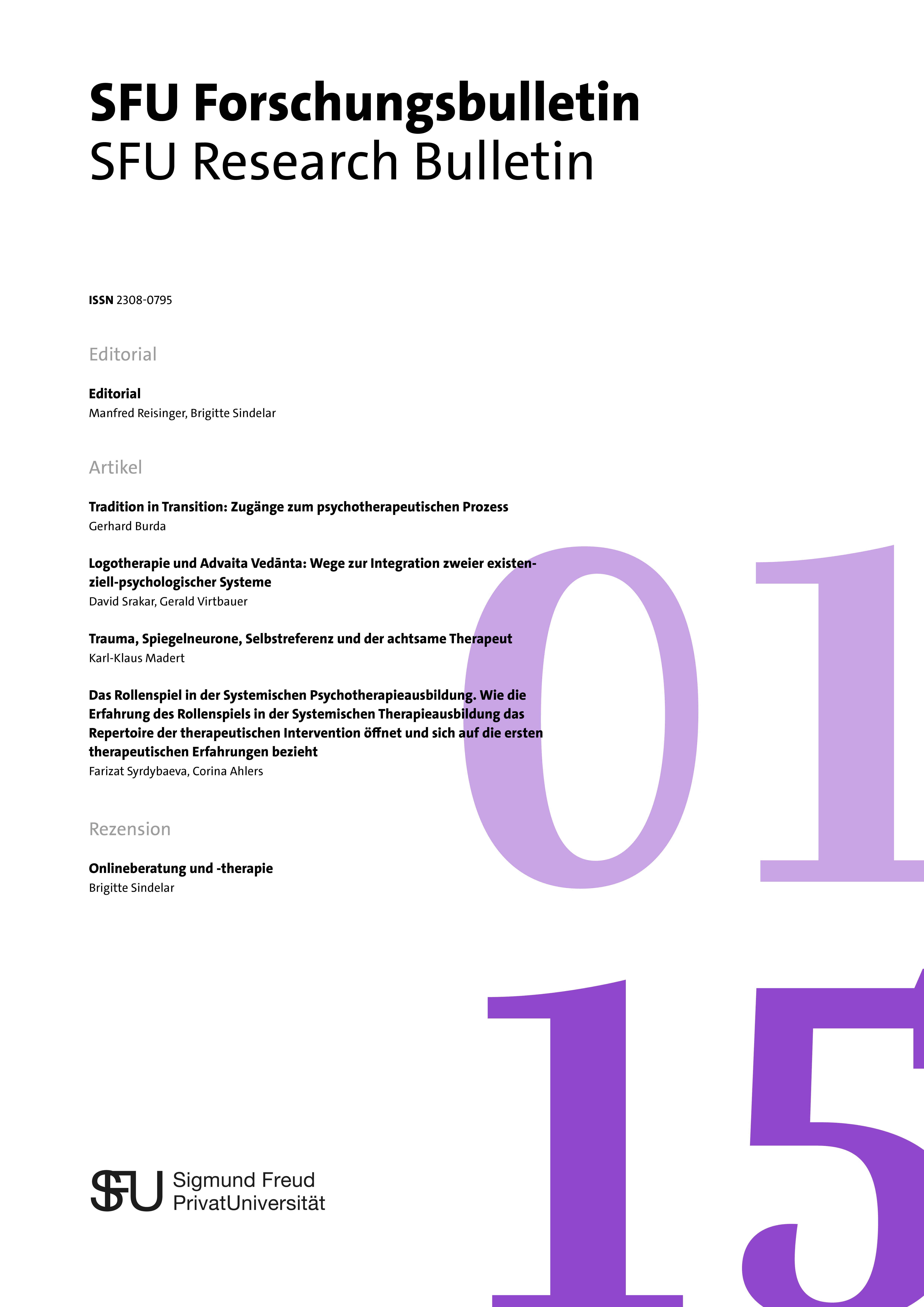Logotherapie und Advaita Vedānta: Wege zur Integration zweier existenziell-psychologischer Systeme
DOI:
https://doi.org/10.15135/2015.3.1.11-27Abstract
Der Artikel führt in drei Konzepte, die im Advaita Vedānta eine entscheidende Rolle spielen – die Person (Sanskrit jīva), das innere Organ (antaḥkaraṇa) und das Selbst (ātman), ein. Verbindungen zu Frankls Logotherapie sind sinnvoll und ausbaufähig. Erste Schritte zu einer Integration werden behandelt.
Literaturhinweise
Aurobindo, S. (1997). The complete works of Sri Aurobindo (Vol. 19) – essays on Gita. Pondicherry: Sri Aurobindo Ashram Publication Department. Retrieved March 6, 2013 from http://www.sriaurobindoashram.org/ashram/sriauro/writings.php
Dash, A. S. (2008). Indian psychology of motivation. In K. R. Rao, A. C. Paranjpe, & A. K. Dalal (Eds.), Handbook of Indian psychology (pp. 336–347). New Delhi: Cambridge University Press India.
Deutsch, E., & Dalvi, R. (Eds.). (2004). The essential Vedānta: a new source book of Advaita Vedānta. Indiana: World Wisdom, Inc.
DuBois, J. M. (2004). Understanding Viktor Frankl’s theory and therapy of mental disorders. In V. E. Frankl, On the theory and therapy of mental disorders: an introduction to logotherapy and existential analysis (Trans. J. M. Dubois) (pp. ix–xliii). New York: Brunner-Routledge.
Frankl, V. E. (1986). The doctor and the soul: from psychotherapy to logotherapy (Trans. R. Winston & C. Winston, 3rd ed., expanded). New York: Vintage Books.
Frankl, V. E. (1988). The will to meaning: foundations and applications of logotherapy (Expanded ed., 32th impression). New York: Meridian.
Frankl, V. E. (2004). On the theory and therapy of mental disorders: an introduction to logotherapy and existential analysis (Trans. J. M. Dubois). New York: Brunner-Routledge.
Frankl, V. E. (2011). Man’s search for ultimate meaning (2nd ed.). London: Rider.
Hughes, B. M. (2008). How should clinical psychologists approach complementary and alternative medicine? Empirical, epistemological, and ethical considerations. Clinical Psychology Review, 28(4), 657–675. doi: 10.1016/j.cpr.2007.09.005
Hume, R. E. (1921). The thirteen principal Upanishads. London: Oxford University Press. Retrieved March 10, 2013 from http://archive.org/details/thirteenprincipa028442mbp
Indich, W. M. (1980/1995). Consciousness in Advaita Vedānta. Delhi: Motilal Banarsidass Publishers Pvt. Ltd.
Jha, A. K. (2008). Personality in Indian Psychology. In K. R. Rao, A. C. Paranjpe, & A. K. Dalal (Eds.), Handbook of Indian Psychology (pp. 348–360). New Delhi: Cambridge University Press India.
Karapatra, S. (2002). Advaita Bodha Deepika: the lamp of non-dual knowledge (Trans. V. Munagala). Tiruvannamalai: Sri Ramanasramam.
Lukas, E. (2000). Logotherapy textbook: meaning-centered psychotherapy consistent with the principles outlined by Viktor E. Frankl, MD – concept of human beings and methods in Logotherapy (Trans. T. Brugger). Toronto: Liberty Press.
Milne, J. (1997). Advaita Vedānta and typologies of multiplicity and unity: an interpretation of nondual knowledge. International Journal of Hindu Studies, 1(1), 165–188.
Paranjpe, A. C., & Rao, K. R. (2008). Psychology in the Advaita Vedānta. In K. R. Rao, A. C. Paranjpe, & A. K. Dalal (Eds.), Handbook of Indian psychology (pp. 253–285). New Delhi: Cambridge University Press India.
Radhakrishnan, S. (1923/1948). Indian philosophy (2nd ed., Vol. 1). London: George Allen & Unwin, Ltd.
Radhakrishnan, S. (1927/1948). Indian philosophy (2nd ed., Vol. 2). London: George Allen & Unwin, Ltd.
Radhakrishnan, S. (1960). The Brahma Sūtra: the philosophy of spiritual life. London: George Allen & Unwin Ltd.
Rao, K. R. (2002/2005). Consciousness studies: cross-cultural perspectives. North Carolina: McFarland & Company, Inc., Publishers.
Rao, K. R. (2005). Perception, cognition and consciousness in classical Hindu psychology. Journal of Consciousness Studies, 12(3), 3–30.
Rao, K. R. (2012). Complementarity of Advaita non-dualism and Yoga dualism in Indian psychology. Journal of Consciousness Studies, 19(9–10), 121–142.
Śaṅkarācārya, S. (2003). Vivekacūḍāmaṇi (Trans. S. Mādhavānanda, 17th impression). Kolkata: Advaita Ashrama.
Sarma, D. (2011). Classical Indian philosophy – a reader. New York: Columbia University Press.
Srakar, D. (2014). Complementation of logotherapy with the ideas of Advaita Vedānta (Unpublished Bachelor’s Thesis). Sigmund Freud University, Vienna.
Yandell, K. E. (1999). Bhagavad Gita. In R. Audi (Ed.), The Cambridge dictionary of philosophy (2nd ed.) (p. 87). New York: Cambridge University Press.
Yandell, K. E. (1999a). Shaṅkara. In R. Audi (Ed.), The Cambridge dictionary of philosophy (2nd ed.) (p. 840). New York: Cambridge University Press.
Yandell, K. E. (1999b). Upanishads. In R. Audi (Ed.), The Cambridge dictionary of phi-losophy (2nd ed.) (pp. 941–942). New York: Cambridge University Press.
Yogananda, P. (2007). God talks with Arjuna: the Bhagavad Gita – royal science of God-Realization (Vol. 1, 4th impression). Kolkata: Yogoda Satsanga Society of India.
